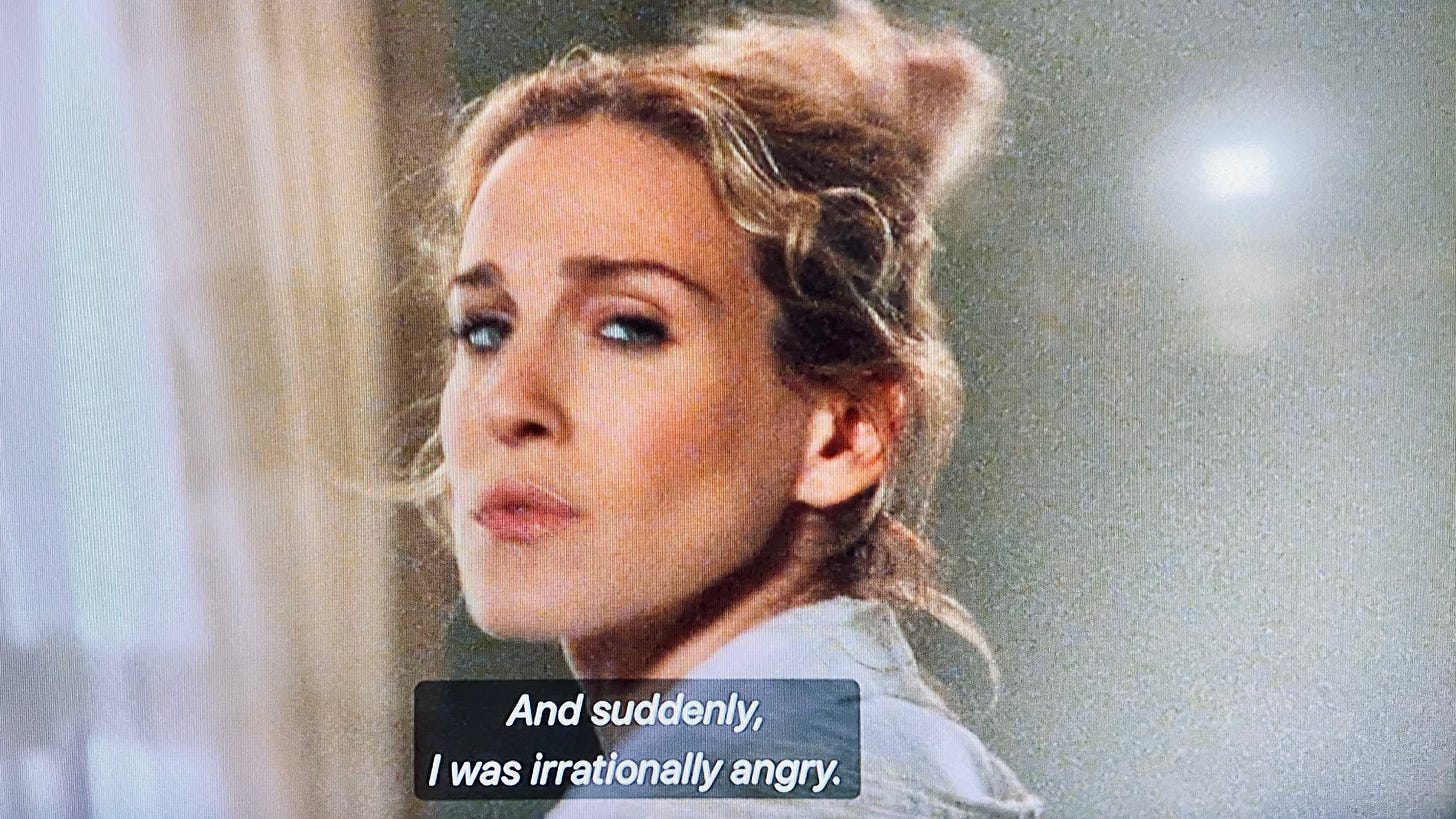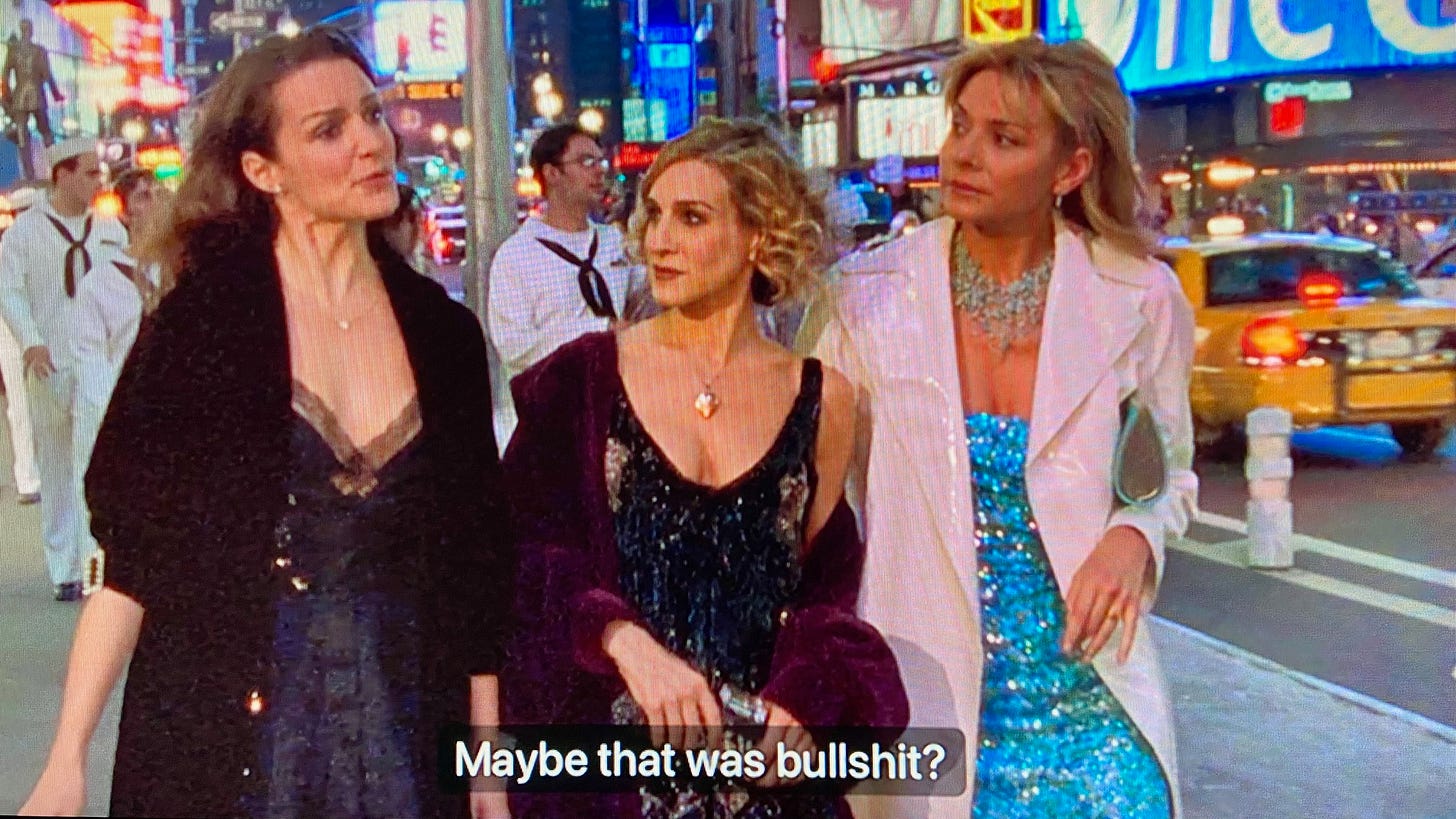I was at a dinner party last Saturday and one of the first things the host — my very dear friend and a subscriber — said to me was: “I think I feel differently about the And Just Like That… finale than you do.”
In my recap of the episode, I’d written that I thought the show had gone out on “some pretty ok vibes.” And I kinda still stand by that. But, as I explained to my friend, I’d written the recap right after watching the finale for the first time — such is the lot of a recapper who no longer gets screeners in advance — and while I had plenty of criticisms of and jokes about all the absurd, deranged things I’d just seen, that line about the “vibes” was an immediate reaction to the show ending with Carrie Bradshaw accepting and finding a measure of joy in the life she’d made for herself, despite the prospect of potentially never being in a romantic relationship again.
I still appreciate that choice, and I still think ending Carrie’s story with her dancing alone in her home felt…right. Uplifting even! I mean, on a purely personal level, it felt true to my own experience as a 43-year-old single person.
But, as I told my friend, in the days since publishing my recap I’d rewatched the episode and some episodes of Sex and the City, and I’d read all the reviews and listened to all the podcasts about And Just Like That that I’d avoided while covering the show myself, and I found myself… becoming irrationally angry.
I think the best way I can characterize what I was — and kinda still am — feeling is that it was like a mild hangover. Or, no, not like a hangover. More like when you decide to treat yourself to a bunch of comfort food and a dumb, hopefully fun movie, and then you wake up the next morning feeling a little sick and realize that everything you consumed was junk — including the movie. (The movie was Jurassic World: Rebirth, incidentally.) You thought it would all make you feel better, but actually it all made you feel worse.
I was (am?) annoyed with And Just Like That — again, irrationally; it was, after all, just a dumb TV show — for failing at pretty much everything it ostensibly promised to do: revisit beloved characters and tell compelling stories about a new phase in their lives; have them grapple with the ways the world has changed since their heyday; meet the current cultural moment by introducing more diverse characters; incorporate those new, non-white characters convincingly into the central friend group. Etc, etc. But I was especially annoyed with the show’s utter failure to even do its most basic job, which was to be at-all fun.
I joked in one of my recaps that the show was bad for anyone experiencing depression, but that wasn’t actually a joke! And Just Like That was depressing, because — and I may just be speaking for myself here — it was so consistently dismaying. We came back to it week after week hoping it would be a fun, frivolous distraction, an escape from the daily horrors in our newsfeeds, and week after week, it was a disappointment. I’ve tried repeatedly to rewatch episodes, hoping to lose myself in a little glamour and froth, but every time I’ve had to turn it off in disgust. It was just impossible to escape the sympathetic embarrassment I felt for everyone involved in something so pitiful! The show was cringe comedy without the actual comedy. It was an offense to the sensibilities of anyone who cares about decent storytelling and acting! It made for, in the end, a generally unpleasant television-watching experience.
I’ve written about TV for a lot of years, so I am aware that many shows are dumb! Plenty of shows are as poorly written and badly acted as And Just Like That was! But somehow, this show’s inanity felt like a betrayal precisely because I so badly wanted it to be, if not good, at least entertaining.
Of course, And Just Like That had its defenders. I’ve seen social media posts arguing that we “haters” are just mad that the characters got old, or that we were all perhaps unconsciously resentful that the show made space for women of color. I don’t buy any of that. AJLT’s writers clearly had no idea what to do with the wonderful Karen Pittman, Nicole Ari Parker, and Sarita Choudhury, wasting their talents on underdeveloped throw-away side plots or siloing them off to the point that they could have been on completely different (equally lame) shows. I mean, they barely knew what to do with Charlotte and Miranda, let alone the new girls!
This week, another friend pointed me to a recent episode of Wesley Morris’s New York Times podcast Cannonball on which Taffy Brodesser-Akner defended And Just Like That as a realistic depiction of wealthy, out-of-touch Upper East Side white women. Carrie, et. al., she argued, would seem ridiculous in their ham-fisted attempts to befriend people of color. They would be baffled by trans and nonbinary people; they would be frustrated with the youths.
“If you hate this show, do you actually just hate middle age women?” Brodesser-Akner asked.
I find that to be a profoundly bad faith interpretation of the criticisms of the show.
The problem with Brodesser-Akner‘a read is that it ignores the fact that And Just Like That was so resolutely on Carrie, Miranda, and Charlotte’s side that it failed utterly as a satire of wealthy white women. The show wanted so badly for us to love its characters despite their foibles and obscene wealth and seeming disinterest in the state of the wider world. It wanted us to laugh with them at how bizarre and confusing everyone else was. I’m not sure it ever even tried very hard to satirize their privileged cluelessness. The problem wasn’t so much that the characters were out of touch, it was that it was so obvious that the show’s writers were.
The more fundamental problem with And Just Like That, I think, is that its creators never really had a clear sense of what they wanted the show to be or what they wanted to do with these characters beyond getting them back on TV in fancy clothes and pretty apartments. As best as I can tell from various reporting and interviews around the show, Sarah Jessica Parker, Michael Patrick King, and co. wanted to do a third Sex and the City movie, which would have centered around Carrie grieving after the death of Mr. Big — a contrivance I have to assume had to do with Chris Noth’s general disinterest in continuing to play the role, and the fact that Carrie and Big happily married wouldn’t have been particularly compelling, rather than with any deep interest in exploring a middle age woman’s grief. On paper, that already sounds like a dismal film. When Kim Cattrall refused to sign on, the concept was retooled as And Just Like That, and the show’s first season was a version of what the film would have been.
With Carrie’s grief arc more-or-less wrapped up in Season 1, it became increasingly clear that the show was adrift in subsequent seasons, unsure of what to do next. The return of Aidan Shaw was an obvious attempt at fan service that backfired spectacularly, never really justifying itself with any real insight into these two characters and why they should or should not be together. As Cathy Cullen, host of The Cinemile podcast, and her guests consistently pointed out in their recaps of the show, And Just Like That’s storylines always seemed to be clunkily retrofitted around a guest star or a set piece rather than genuinely exploring any themes or ideas. The episodes meandered pointlessly, and every stupid gag seemed to be serving MPK’s weirdly tasteless sense of humor rather than an actual story worth telling.
So, it was a bad show. I don’t have to tell you! You’ve seen it! And it was fun to make fun of!
So, why am I so mad about it now that it’s all over?
This whole And Just Like That recap project of mine grew out of the success of my coverage of the first season for Grazia USA. The show was a big draw for the magazine’s readership, and the reaction to its oddness allowed me to write about it in a kind of dumb, jokey way that was new and fun for me. But the more I wrote about it and Sex and the City and talked about both shows with my colleagues, the more I had to confront my psychotically encyclopedic knowledge of the original series and the massive role it had played in my own life.
I effing loved Sex and the City when I was in college. Like so many other girls and gays, it presented me with a blueprint for a fabulous cosmopolitan life — one that I pursued for the better part of the past 20 years. I moved to New York. I became a writer. I bought a lot of clothes. I slept with a lot of men. At times, I felt like I was within martini-sloshing distance of the fabulous life I’d learned to want.
But as the years dragged on and the media industry changed and my career kinda stagnated, it became harder and harder to hold onto the fantasy that Sex and the City sold us. It’s not a particularly original story; I’m sure plenty of people who moved to New York in 2005 to become writers because Carrie effing Bradshaw told them to could say the same. By the time And Just Like That rolled around, I was already as skeptical, maybe even a little resentful, of the show’s Disneyland depiction of careless wealth in Manhattan as I should have been all along. I mean, it’s basically like the American Dream! It was all always a lie for everyone but an extremely lucky few!
You see what I mean about being irrationally angry?
The truth is, I’m not angry at And Just Like That. I’m annoyed at myself for buying into the bullshit Sex and the City sold me. I don’t find Carrie Bradshaw annoying — I mean, actually, I do, but I’m more annoyed at myself for modeling so much of my life on hers. (Gah! Ugh! I’m annoyed even admitting that! Please try to forget it if you ever encounter me in person!)
In a truly bizarre twist of fate, the end of And Just Like That and, presumably, the whole Sex and the City franchise happens to coincide with the end of my time in New York. After more than 20 years, I’m leaving the city. Possibly for good, who knows. I’m disassembling the life I’ve been trying to hold onto here for just over two decades, and I am salty about it! I’m having to confront the choices I’ve made, my own shortcomings that have led me to this point, and I am — say it with me — irrationally angry!
And I know just what to take it irrationally out on: This dumb show that has disappointed me and revealed a thing I thought I loved to be entirely empty and, in the end, worthless.





Reading this is like a premonition of my reaction to the sequel to 'The Devil Wears Prada' (the film that conned ME into pursuing publishing in NYC...)